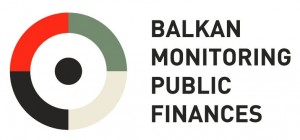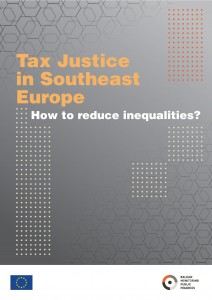 Within the CSOs as equal partners in monitoring of public finance project, 10 organisations from Bosnia and Herzegovina, Bulgaria, Kosovo, Macedonia, Montenegro, Serbia and Slovenia have examined trends in tax policies in Southeast Europe, including the role of the EU and financing institutions.
Within the CSOs as equal partners in monitoring of public finance project, 10 organisations from Bosnia and Herzegovina, Bulgaria, Kosovo, Macedonia, Montenegro, Serbia and Slovenia have examined trends in tax policies in Southeast Europe, including the role of the EU and financing institutions.
Taxation is an important part of our lives. Tax policies have a major impact on economy, society and environment, while they also shape our public finances and public services. Having a fair tax system is of high importance, yet many countries’ tax systems are not fair. The regional study Tax Justice in Southeast Europe – How to reduce inequalities? analyzed the tax systems in 7 Western Balkan countries.
In EU-28 taxes represent 38.7 % of GDP, while in the Western Balkan countries the participation of taxes in GDP is below 30%. Therefore, there is a room for increasing the taxes, mainly for rich individuals and companies, and at the same time abolishing the tax exemptions and tax credits given to foreign and domestic companies. Of the studied countries, only Slovenia has a progressive system in place when it comes to personal income tax, while the other countries show a low level of progressiveness in personal income tax. The Value Added Tax in some countries contains elements of progressiveness, while corporate income tax is everywhere flat. Progressive tax modernization can and should raise significant revenue to finance job creation and public investments, shrink deficits, and ease pressure elsewhere in the budget. It can moderate recent and persistent trends toward widening income inequality and hyper-concentration of wealth, helping to restore a society of shared prosperity. All the researched countries face problems in servicing basic social needs, including pensions and health, often not only due to insufficient amount of collected taxes, but also due to competing priorities, such as paying off debts.
In our Policy Brief – Tax Justice in Southeast Europe – How to reduce inequalities? you can read what we think needs to be changed by the local and national governments and by the EU, international financial institutions and other project financiers. We would like to emphasize that we think the analyzed countries must take the challenge and conduct thorough reforms of their tax systems. The reforms should mainly be directed to reduce income inequalities, make tax systems more just and fairer, increase tax revenues and expand and improve the social services through increasing tax revenues.
The analysis can be found here and the accompanying Policy brief here.

 ENGLISH
ENGLISH